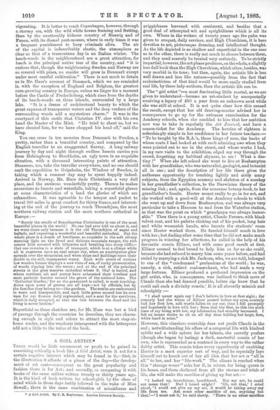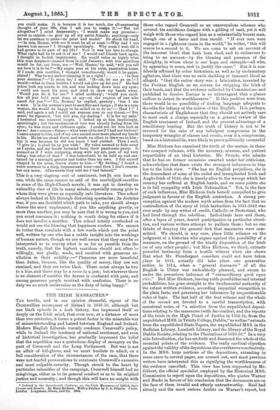A GIRL ARTIST.*
THERE would be little • amusement or profit to be gained in examining critically a book like A Girt Artist, were it not for a certain negative interest which may be found in it,—first, in the illustration it affords of a phase of the day—the develop- ment of art cant—consequent on the great popularity and fashion there is for Art ; and secondly, in comparing it with books of the same calibre written twenty or thirty years ago. It is the kind of book written for school-girls by the class of mind which in those days feebly followed in the wake of Miss Sewell ; there is the same combination of missishness and • A Girl Artist. By C. B.. Eaglestone. London Literary Society,
priggishness leavened with sentiment, and besides that a good deal of attempted wit and sprightliness which is all its own. Where in the writers of twenty years ago the palm was given to croquet, daily services, and High Churchism, it is here devotion to art, picturesque dressing, and intellectual thought. As the life depicted is as shallow and superficial in the one case as in the other, there is really not much to choose between them, and they need scarcely be treated very seriously. To be strictly impartial, however, the art phase produces, on the whole, a slightly less dull book than the High Chnrchism, which often, besides, was very morbid in its tone; but then, again, the artistic life is less well drawn and less like nature—possibly from the fact that ecclesiasticism of that kind would be more easily studied from real life, by these lady-authors, than the artistic life can be.
The "girl artist "—a most fascinating little mortal, as we are given to understand—became an art-student by unexpectedly receiving a legacy of £80 a year from an unknown aunt while she was still at school. It is not quite clear how this caused the result, except that her old drawing-master advised her in consequence to go up for the entrance examination for the Academy schools, when she confided to him that her ambition
now was to take in regularly the Art Journal, and have a season-ticket for the Academy. The heroine of eighteen is refreshingly simple in her confidence in her future teachers :— "To be taught by the R.A.'s, those kings of men, the backs of whose coats I had looked at with such admiring awe when they were pointed out to me in the street, and whose works I had, in ray rare visits to the exhibition, edged my way through the crowd, forgetting my habitual shyness, to see ! What a des-
tiny I" When she left school she went to live at Rochampton with her grandfather, who was naturalist, geologist, and botanist
all in one; and the description of her life there gives the
authoress opportunity for touching lightly and airily many subjects, from the Egyptian mummy and skeleton of a. monkey in her grandfather's collection, to the Darwinian theory of the missing link ; and, again, from the nonsense botany-book, to her grandfather's fossils. Hester meant really to go in for art, and she worked with a good-will at the Academy schools to which she went up and down from Roehampton, and was always very particular to take a Hansom to and from the Waterloo station, as that was the point on which " grandpapa was always inexor- able." Then there is a young artist, Claude Ferrers, with black velvet coat, and his palette sticking out of his pocket, long hair and. white womanish hands, who haunts the students' roam since Hester worked there. He fancied himself much in love
with her; but finding after sonic time that he did not make much progress in winning her affections, he called in the help of his
favourite cousin Ellinor, and with some good result at first. Ellinor seemed to-feel bound to help him so far as she could, because she had refused to marry him some years before, and had ended by marrying a rich Mr. Jackson, who, we are told, belonged to one of the "condemned " professions of the world ; he was, namely, a rich, retired coal-merchant, who had made a very large fortune. Ellinor produced a profound impression on the girl artist, who, in consequence, was inclined to think more of Claude than she had deemed possible, before she knew that he could call such a divinity cousin.: It is all absurdly missish and schoolgirly :—
" I shall never again say I don't believe in love at first sight; for scarcely bad the vision of Ellinor passed before my eyes, scarcely had her first low, soft words fallen on my ear, than I fell promptly and hopelessly in love with her ; from that the first, to this the sixth time of my being with her, my infatuation had steadily increased. I felt an insane desire to sit on all day thus holding her large, firm, white hand in mine."
However, this vicarious courtship does not profit Claude in the end ; notwithstanding his offers of a congenial life with kindred spirits and a wide sphere for her talents, she secretly prefers (though she began by hating) a dark, masterful cousin of her own, who is represented as a contrast in every way to the rather flabby artist. This cousin takes every opportunity of snubbing Hester in a most superior sort of way, and he especially lays himself out to knock out of her all idea that her art is "all in all" to her, and her "life-work." The climax is reached when this "strange wooer" asks her if, in return for being queen in his home, and there sheltered from all the storms and trials of life, she will make the sacrifice of giving up her art :—
"I looked up, incredulous, bewildered. Not my art, he could not mean that ! Had I heard aright ? Oh, not that,' I cried aloud, could not give up my art, it would be taking away my life from me. Ask some other sacrifice of me, anything but that.'—' I must ask it,' he said slowly. There is no other sacrifice
you could make. It is because it is too much, the all-engrossing thought of your life, that I ask you, to resign But not altogether !' I cried desperately; I would make any promise— never to exhibit—to give up all my artist friends ; anything—only let me continue to paint—to paint and model.' He shook his head.
In this, Hester, with me it must be all or none!—Why had I not known him sooner ? I thought agonisingly. Why mast I wait till it had grown to be part of my life ? Now it was too late to change. What right had be to ask it of me ? I would call Claude back again, I thought in foolish impetuosity. He would value so highly what this man despised—turned from in cold distaste ; with him sacrifices would be for, not from, me.—' Well, Hester,' he said, will you tell me how it is to be P'—My anger rose at his calm, passionless tones. If I made this sacrifice, I thought tumultuously, would it be appre-
ciated ? Was he not rather claiming it as a right ? that your decision ?'—' It must be,' I said. 'If—oh, let me go on !—I would—what is there besides I would not give up for you?' He had taken both my hands in his, and was looking down into my eyes ; I could not meet his gaze, and tried to draw my hands away. Would you do it for me ?' I cried suddenly ; would you sacri- fice all you hold most, dear, at my—at the request of one who cared for you F'—' No, Hester,' he replied, gravely ; but I am a man. It is the woman's part to sacrifice and resign ; if she is a true woman, she would be happy to be called on to do so.'—' Must I?' I said, and again a sob I could not repress rose to my throat.—' Not mast,' he repeated, 'but will you, my darling ? It is for my sake.' I hesitated one moment longer. I looked up at him imploringly, agonisingly ; but the tenderness of love was already fading from his eyes; he was stern and obdurate again. I could not let him look at me BD Art—career—future—what were all to me if I had not his love I came nearer to him, and of my own accord once more placed my hands in his. He let me stand there, and made no effort to draw me to him ; but it was because he did not know I had yielded. Then I said, 'I give in; it shall be as you wish.' My voice seemed to fade away as I spoke, and my hands loosened from their passionate grasp. It seemed as if I were resigning, along with my art, part of my very being; but what of that ? I was henceforth to be held up and sus- tained by a strength greater and better than my own. I felt myself clasped in his arms, drawn closer to him.—' My darling,' I heard a voice murmur in a deep, impassioned tone—and then I don't remem- ber any more. Afterwards they told me I had fainted."
This is a very claptrap sort of sentiment, but lit can hurt no one, 'while the same cannot be said of the morbid:self-sacrifice in some of the High-Church novels ; it was apt to develop an unhealthy view of life in many minds, especially among girls to whom they were given as especially safe literature. This school always looked at life through distorting spectacles ; its doctrine was, if you are doubtful which path to take, you should always choose the most unpleasant ; if you like anything greatly, or more than another, you may be sure that it is wrong to you, and you must renounce it ; nothing is worth doing for others if it does not involve a sacrifice. This school totally overlooked or would not see the blessing that happiness confers. We cannot do better than conclude with a few words which put the point well, written by one who has a subtle insight into the workings of human nature, though we are well aware that they may be so interpreted as to convey what is as far as possible from the truth, namely, that the highest sacrifices should not often be willingly, nay gladly, made, and received with generous ex- ultation in their nobility :—" Pleasures are more beneficial than duties, because, like the quality of mercy, they are not strained, and they are twice blest. There must always be two to a kiss, and there may be a score in a jest; but wherever there is an element of sacrifice the favour is conferred with pain, and among generous people received with confusion. There is no duty we so much undervalue as the duty of being happy."



































 Previous page
Previous page